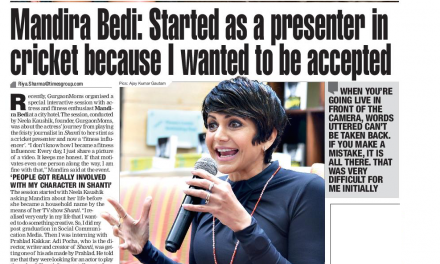In a recent meeting with women professionals in Goa, we discussed what we really value about being in India. The answers were very interesting – diversity of people and cultures, the history and heritage and so on. But two things really stood out. One was the freedom to choose what each one wants to do and be. And the second – being treated as equal. It emerged at this meeting that Freedom and Equality – two big and important words – form the basis of our life and experience in India.
And it made me think. What is this wasn’t so? What if we could not travel from one state to another without permit? What if we were not allowed to speak our mind, to meet and argue or to protest if something was wrong?
Something very basic and human would be gone from our lives. For me, personally, it would be good reason to leave the country as fast as I could!!! For me, as I am sure for many of us, being Indian is an experience of these rights. Perfect in implementation or not, THEY ARE THERE! And each day we experience the power of these rights in our lives.
But as they say, “with great power comes great responsibility”. This begs the question then – what is our responsibility as Indians?
For this we will have to go back to the same place where our rights emerged. Our rights did not come to us just like that. They were the product of intense debate and discussion for three years, among 310 people and over 165 meetings. Each of these rights was discussed threadbare. Should women be ensured equal treatment even if majority at that time would not even step out of their homes? Should illiterate people be ensured equal and free treatment? These were some of the questions they grappled with. But on 29th November 1949, a historic agreement was reached. The values of freedom and equality made up the foundation of our Constitution and the structure of the State and government was created to bring about a system of laws and rules to make sure that all citizens could access these rights in their lives.
But what did the constitution ask of the citizens of India? What were they supposed to do? For this we will have read carefully the Preamble of the Constitution. It starts with ‘we, the people of India’ and ends with ‘give to ourselves this constitution’.
These are powerful words signifying our ownership of the nation and all the systems within it. Looked this way, our responsibility is clear. First, I as a citizen will have to ensure that I practice the values of equality and freedom in my life, my family and the social groups to which I belong. Think about this deep and hard. Look at our own behaviour and evaluate whether we are really following these principles within your family and outside.
And second, I as a citizen, will have to ensure that the system of governance created to implement our rights actually works. This means that it is not enough to just talk about how badly things work. We will have to make them work well. In simple words, its not enough to say that the Municipality of Gurgaon does not do its job. The citizens of Gurgaon will have to do their job of making sure it delivers.
The key question is: while we are always ready to enjoy and enforce our rights, are we ready to walk the talk on our responsibilities?





i m totlly agree with you